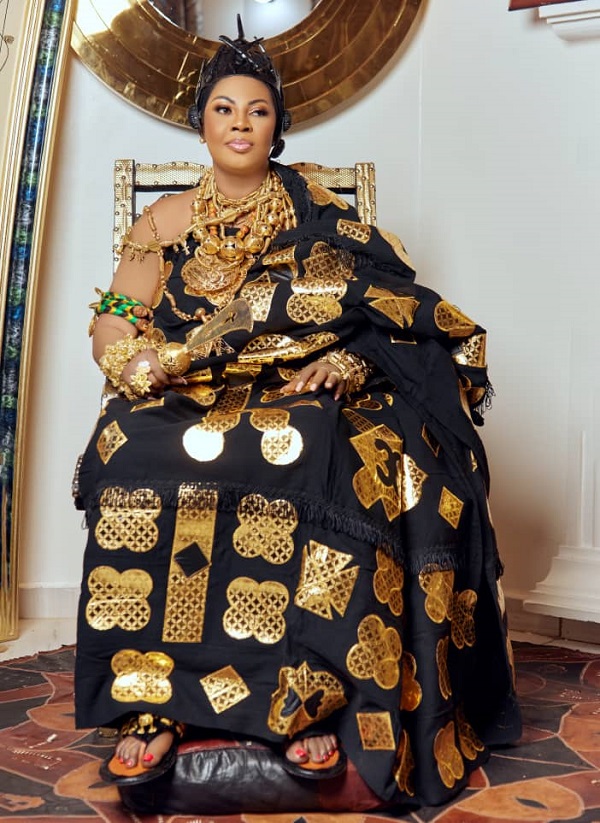
A female King ... Nana Adepa Amponsah Yeboah I
In the Akan chieftaincy setting, Ohemaa (Queen) is the title given to a female who is enstooled, and so usually, the title 'Ohene', which is the Akan word for king or chief, is changed to “Hemaa”.
There are female roles such as Nkosuohemaa (Development Queen), Nifahemaa (Queen of the right position in the army), Sanaahemaa (head of treasury), Benkumhemaa (Queen of the left position in the army) and many others.
Advertisement
The situation is, however, different when it comes to Nana Adepa Amponsah Yeboah I. She is a woman but her role is not that of a queen but king. In 2017, she was enstooled as the Kyidomhene of Akyem Tafo, a town in the Eastern Region.
She is the first female to be enstooled as Kyidomhene in the Akyem Abuakwa Traditional Area.
In the past, the role of the Kyidomhene was to protect the homeland when the king and his army went to war. It also included training and selecting men fit to join battles when necessary and so naturally, it was men who were deemed fit for that role.
Even today, most occupants of the position in other Akan areas are men, as the role is seen as a military position (defence minister) which needs the strength and vigour of a man. The traditional stool for the occupant is black and so the person must be bold and courageous.
Currently, due to modernisation, traditional kingdoms don’t go to war and the role of the Kyidomhene has changed to become the king’s ‘rear guard’ in different forms.
Nana Adepa, who recently held a dinner to celebrate her fifth year as Kyidomhene, told The Mirror in an interview last week that the role was not only limited to supporting the king during wars but also supporting him in developing and moulding the town and its people.

Nana Adepa arriving at a dinner to celebrate her fifth anniversary as Kyidomhene
“Usually when I am introduced as a king, many are surprised as it is not common. People will stand up from their seats to catch a glimpse of who this “woman king” is and I see the shock on their faces. Some wonder if there are no men in our family fit for the position; the questions are many but I have become used to them,” she said.
Enstoolment
Nana Adepa is a member of the royal family and so growing up, she was aware of the possibility of being enstooled. However when her uncle, the Omanhene of Akyem Tafo, Osabarima Adusei Peasah IV, called on her to support him build the town, she was reluctant.
She said aside her busy work schedule, she was also not enthused about chieftaincy-related issues and wanted to live a private life.
“It was my mother who advised me to consider the role. She said my uncle and his elders had seen some virtues in me. She advised that such roles came with honour so I should consider it. So after almost five years of back and forth, I agreed,” she explained.
Even then, she did not know that her position was a male’s role. She wondered what role they wanted her to play as there was already a queenmother for the town. It was not until a month to her enstoolment that she was informed of her specific role.

Anyone familiar with how kings dress in the Akan traditional setting will know Nana Adepa is not a queen but a king
“The role of the Kyidomhene, although part of the chieftaincy setting, had never been filled by anybody in our town, so I wondered why I was the first to occupy such an important role, especially being a woman. My uncle is a man of few words so he only smiled and said that was what the elders had decided. I spoke extensively to some friends who knew about chieftaincy and they all advised that if the elders of my town deemed it fit, I must listen to them,” she recounted.
Life as Kyidomhene
On special occasions, Nana Adepa’s regalia depicts her role as a king. Even without introduction, anyone familiar with how kings dress in the Akan traditional setting will know Nana Adepa is not a queen but a king. The type of cloth, how she wears them, her ornaments and “ahenema” (traditional slippers) are those for kings. She also wields a ceremonial short sword or fly-whisk.
Nana Adepa said she believed in the power of her stool as a lot had changed about her since her coronation.
She explained that naturally, she was a calm and introverted person who loved her privacy and hardly spoke in public. However, in the last five years,that had changed as she was able to attend public functions with or without escort and spoke openly about issues affecting people.
She admitted that fitting into the role was not easy in the early days. Personally, she had to devise a way to make her people feel her impact and also support the Omanhene in building the town.
She said although people did not reject her enstoolment, many wondered what she was bringing to the stool, particularly as a woman. But she resolved to focus on the plans she had for the community rather than pay attention to what people had to say.

Nana Adepa (left) interacting with some widows and senior citizens at Akyem Tafo
Asked if she wasn’t scared of certain rituals that came with the role, she explained that “many people confuse culture and idolism. The rites performed before and during the coronation and on sacred days are part of our culture and there is a difference between that and serving lesser gods. I am a staunch Christian who believes and serves God, and even in the room where my stool is, I have my Bible there”.
Projects embarked on
Nana Adepa explained that after she was enstooled, she realised that the nursery and kindergarten section of the Presbyterian school in the town was in a deplorable state and therefore decided to construct and furnish an 11-unit classroom block which she handed over to the Presbyterian Church and Ghana Education Service.

Last year, she built and furnished a classroom block for the nursery and kindergarten unit of the Presbyterian School in Akyem Tafo
She has also instituted an interest-free loan scheme to support women with small businesses in the community and also enrolled a number of young people in different vocations. Due to her interest in education, she also sponsors many students by paying their fees, stipends and giving them “provisions”.
“Most of these students complete school and struggle with finding jobs; I always have a heap of documents from such students who I help secure jobs. I have presented a number of vehicles to some drivers and also meet with the aged and widows in the community regularly. I believe in our own small way, we can contribute to the development of Akyem Tafo. Any opportunity I get, I try to put in a word for my people. I believe chieftaincy is not about dressing up or exerting your power over people, but how you are able to impact their lives,” she added.

She has received many citations and awards for her contribution towards the development of her community and the nation
At her fifth anniversary dinner, she launched the Nana Adepa Development Foundation (NADF) which was set up to help raise funds to take care of the aged, widows, brilliant needy students and the vulnerable in her community and the whole country.

Nana Adepa is a woman of many parts; she owns and runs businesses in real estate, haulage, printing, fuel supply, event organising and consultancy. She also owns a wine and liquor shop at Dzorwulu, a suburb of Accra.
To young women she advised, “You never know what the future holds for you. I am sure if I had lived a lifestyle not worthy of being in such a position, my people would have rejected me when I was picked for the role.”
Writer’s email: [email protected]



